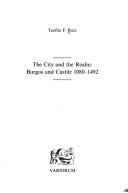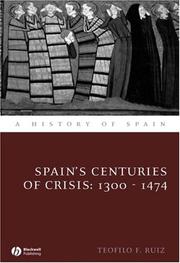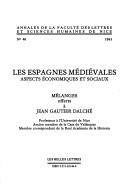| Listing 1 - 4 of 4 |
Sort by
|

ISBN: 0860783294 9780860783299 Year: 1992 Volume: CS375 Publisher: Aldershot (Hants): Variorum,
Abstract | Keywords | Export | Availability | Bookmark
 Loading...
Loading...Choose an application
- Reference Manager
- EndNote
- RefWorks (Direct export to RefWorks)
Spain --- Castile (Spain) --- Burgos (Spain) --- History --- Economic conditions --- Politics and government --- -Burgos (Spain) --- -Castile (Spain) --- -Spain --- -Castile --- Castilla (Spain) --- -Economic conditions --- Espanja --- Spanien --- Hiszpania --- Spanish State --- España --- Estado Español --- Espagne --- Hispania --- Sefarad --- Sepharad --- Shpanye --- Shpanie --- Reino de España --- Kingdom of Spain --- Reino d'Espanya --- Reinu d'España --- Espainiako Erresuma --- Regne d'Espanya --- Reiaume d'Espanha --- Espanya --- Espanha --- スペイン --- Supein --- イスパニア --- Isupania --- 711-1516 --- Spain - History - 711-1516 --- Castile (Spain) - Economic conditions --- Castile (Spain) - Politics and government --- Burgos (Spain) - Economic conditions --- Burgos (Spain) - History

ISBN: 9781405127899 Year: 2007 Publisher: Malden, MA Oxford : Blackwell,
Abstract | Keywords | Export | Availability | Bookmark
 Loading...
Loading...Choose an application
- Reference Manager
- EndNote
- RefWorks (Direct export to RefWorks)
Spain --- Espagne --- History --- Histoire --- 946.02 --- Geschiedenis van Spanje: Arabische suprematie--(711-1479) --- 946.02 Geschiedenis van Spanje: Arabische suprematie--(711-1479) --- 1300-1474
Book
ISBN: 9780691153575 Year: 2012 Publisher: Princeton ; Oxford : Princeton University Press,
Abstract | Keywords | Export | Availability | Bookmark
 Loading...
Loading...Choose an application
- Reference Manager
- EndNote
- RefWorks (Direct export to RefWorks)
"A King Travels" examines the scripting and performance of festivals in Spain between 1327 and 1620, offering an unprecedented look at the different types of festivals that were held in Iberia during this crucial period of European history. Bridging the gap between the medieval and early modern eras, Teofilo Ruiz focuses on the travels and festivities of Philip II, exploring the complex relationship between power and ceremony, and offering a vibrant portrait of Spain's cultural and political life.Ruiz covers a range of festival categories: carnival, royal entries, tournaments, calendrical and noncalendrical celebrations, autos de fe, and Corpus Christi processions. He probes the ritual meanings of these events, paying special attention to the use of colors and symbols, and to the power relations articulated through these festive displays. Ruiz argues that the fluid and at times subversive character of medieval festivals gave way to highly formalized and hierarchical events reflecting a broader shift in how power was articulated in late medieval and early modern Spain. Yet Ruiz contends that these festivals, while they sought to buttress authority and instruct different social orders about hierarchies of power, also served as sites of contestation, dialogue, and resistance. "A King Travels" sheds new light on iberian festive traditions and their unique role in the centralizing state in early modern Castile.
Festivals --- Ceremonial entries --- Popular culture --- Political culture --- Fêtes --- History. --- Political aspects --- Philip --- Travel. --- Espagne --- Spain --- History --- Social life and customs. --- Politics and government. --- Fêtes

ISBN: 2251621466 9782251621463 Year: 1984 Volume: 46 Publisher: Paris: Les Belles Lettres,
Abstract | Keywords | Export | Availability | Bookmark
 Loading...
Loading...Choose an application
- Reference Manager
- EndNote
- RefWorks (Direct export to RefWorks)
Gautier-Dalché, Jean --- Bibliography --- Spain --- Espagne --- Economic conditions --- Social conditions --- Conditions économiques --- Conditions sociales --- Gautier-Dalché, Jean --- Conditions économiques --- Gautier-Dalché, Jean - Bibliography --- Spain - Economic conditions --- Spain - Social conditions --- Histoire --- Moyen age
| Listing 1 - 4 of 4 |
Sort by
|

 Search
Search Feedback
Feedback About UniCat
About UniCat  Help
Help News
News